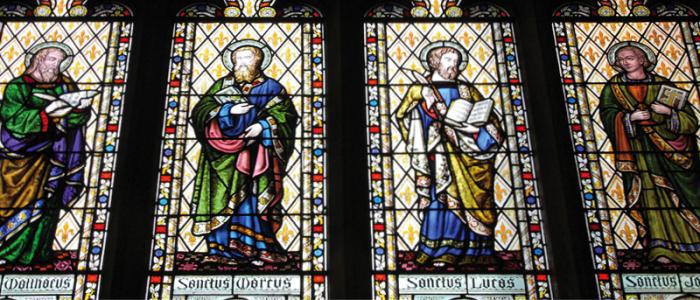
1.17 Як і коли з’явився Новий Завіт?
Історії про Ісуса вперше поширювалися з уст в уста. Вони були записані між 20 і 70 роками після його смерті. Серед найдавніших творів є листи апостола Павла до різних ранньохристиянських громад. Всього Новий Завіт складається з 27 книг і листів.
Щоб визначити, які твори були натхненні Святим Духом, Церква досліджувала низку аспектів, включаючи походження авторів і рівень відповідності текстів всьому вченню Ісуса.
What is the Canon of Scripture?
The Canon of Scripture is the complete list of the sacred writings which the Church has come to recognize through Apostolic Tradition. The Canon consists of 46 books of the Old Testament and 27 of the New. [CCCC 20]
What is the right way to read the Bible?
The right way to read Sacred Scripture is to read it prayerfully, in other words, with the help of the Holy Spirit, under whose influence it came into being. It is God’s word and contains God’s essential communication to us.
The Bible is like a long letter written by God to each one of us. For this reason I should accept the Sacred Scriptures with great love and reverence. First of all, it is important really to read God’s letter, in other words, not to pick out details while paying no attention to the whole message. Then I must interpret the whole message with a view to its heart and mystery: Jesus Christ, of whom the whole Bible speaks, even the Old Testament. Therefore I should read the Sacred Scriptures in the faith that gave rise to them, the same living faith of the Church. [Youcat 16]
What significance does the New Testament have for Christians?
In the New Testament God’s revelation is completed. The four Gospels according to Matthew, Mark, Luke, and John are the centrepiece of Sacred Scripture and the most precious treasure of the Church. In them, the Son of God shows himself as he is and encounters us. In the Acts of the Apostles we learn about the beginnings of the Church and the working of the Holy Spirit. In the letters written by the apostles, all facets of human life are set in the light of Christ. In the Book of Revelation we foresee the end of the ages.
Jesus is everything that God would like to tell us. The entire Old Testament prepares for the Incarnation of God’s Son. All of God’s promises find their fulfilment in Jesus. To be a Christian means to unite oneself ever more deeply with the life of Christ. To do that, one must read and live the Gospels. Madeleine Delbrêl says, “Through his Word God tells us what he is and what he wants; he says it definitively and says it for each individual day. When we hold our Gospel book in our hands, we should reflect that in it dwells the Word that wants to become flesh in us, desires to take hold of us, so that we might begin his life anew in a new place, at a new time, in a new human setting.” [Youcat 18]
How is Sacred Scripture to be read?
Sacred Scripture must be read and interpreted with the help of the Holy Spirit and under the guidance of the Magisterium of the Church according to three criteria:
1. it must be read with attention to the content and unity of the whole of Scripture;
2. it must be read within the living Tradition of the Church;
3. it must be read with attention to the analogy of faith, that is, the inner harmony which exists among the truths of the faith themselves.
[CCCC 19]
[Святий Ієронім, який переклав Біблію на латинь], показує, що захист Святого Письма від помилок або обману обов’язково пов’язаний з його Божественним натхненням і вищою владою… Таким чином, коли за наказом Папи Дамаса він почав виправляти латинську мову, текст Нового Завіту, і [за це був критикований]… Ієронім коротко відповів, що він не був настільки дурним і не настільки неосвіченим, щоб уявити, що слова Господа потребують будь-якого виправлення або не були натхненні Богом. [Папа Бенедикт, Spiritus Paraclitus, н. 13]





